- Home
- Jean M. Auel
The Valley of Horses Page 20
The Valley of Horses Read online
Page 20
She crumpled to her knees, lay down in the snow, and felt warm tears grow cold on her face. She hugged the frigid moisture to her, wrapping herself around it, welcoming its numbing touch. She wanted to burrow into it, let it cover her and freeze out the hurt, and anger, and loneliness. When she began shivering, she closed her eyes and tried to ignore the cold that was beginning to seep into her bones.
Then she felt something warm and wet on her face, and heard the soft nicker of a horse. She tried to ignore Whinney, too. The young animal nudged her again. Ayla opened her eyes to see the large dark eyes and long muzzle of the steppe horse. She reached up, put her arms around the filly’s neck, and buried her face in the shaggy coat. When she let go, the horse neighed softly.
“You want me to get up, don’t you, Whinney?” The horse shook her head up and down, as though she understood, and Ayla wanted to believe it. Her sense of survival had always been strong; it would take more than loneliness to make her give up. Growing up in Brun’s clan, though she had been loved, in many ways she had been lonely all her life. She was always different. Her love for others had been the stronger force. Their need for her—Iza when she was sick, Creb as he grew old, her young son—had given reason and purpose to her life.
“You’re right, I’d better get up. I can’t leave you alone, Whinney, and I’m getting all wet and cold out here. I’ll put on something dry. Then I’ll make you a nice warm mash. You’d like that, wouldn’t you?”
Ayla watched the two male arctic foxes snarling and nipping at each other, fighting over the vixen, and smelled the strong foxy odor of males in rut even from the elevation of her ledge. They are prettier in winter; in summer they’re just a dull brown. If I want white fur, I should get it now, she thought, but made no move to get her sling. One male had emerged victorious and was claiming his prize. The vixen announced his act with a raucous scream as he mounted her.
She only makes that sound when they couple like that. I wonder if she likes it, or if she doesn’t? I never liked it, even after it didn’t hurt anymore. But the other women did. Why was I so different? Just because I didn’t like Broud? Why should that make any difference? Does that female fox like that male? Does she like what he’s doing? She doesn’t run away.
It wasn’t the first time Ayla had refrained from hunting in order to observe foxes and other carnivorous animals. She had often spent long days watching the prey her totem allowed her to hunt, to learn their habits and habitats, and she had discovered they were interesting fellow creatures. The men of the clan learned hunting by practicing on herbivorous animals, food animals, and though they could track and hunt them when a warm fur was wanted, carnivores were never their favorite prey. They did not develop the special bond with them that Ayla had.
They still fascinated her, though she knew them well, but the rapidly pumping fox and the screaming vixen set her to wondering about more than hunting. Every year in late winter they come together like that. In spring, when her coat is turning brown, that vixen will have a litter. I wonder if she’ll stay here under the bones and driftwood, or dig a burrow someplace else. I hope she stays. She’ll nurse them, then give them baby food partly chewed from her own mouth. After that she’ll bring dead prey, mice and moles and birds. Sometimes a rabbit. When her babies are bigger, she’ll bring them animals still alive and teach them to hunt. By next fall, they’ll be almost grown, and next winter the vixens will screech like that when the males mount.
Why do they do it? Come together like that? I think he’s starting her babies. If all she has to do to have them is swallow a spirit, like Creb always told me, why do they couple like that? No one thought I’d have a baby. They said the spirit of my totem was too strong. But I did. If Durc was started when Broud did that to me, it wouldn’t matter if my totem was strong.
People are not like foxes, though. They don’t have babies only in spring, women can have them anytime. And women and men don’t couple just in winter, they do it all the time. A woman doesn’t have a baby every time, though. Maybe Creb was right, too. Maybe the spirit of a man’s totem has to get inside a woman, but she doesn’t swallow it. I think he puts it inside her when they come together, with his organ. Sometimes her totem fights it, and sometimes it starts a new life.
I don’t think I want a white fox fur. If I kill one, the rest will leave, and I want to see how many kits she’ll have. I’ll get that ermine I saw downstream before she turns brown. Her fur is white, and softer, and I like the black tip on her tail.
But that little weasel is so small, her pelt is hardly big enough to make one hand covering, and she’ll have babies in spring too. Next winter there will probably be more ermines. Maybe I won’t go hunting today. I think I’ll finish that bowl instead.
It didn’t occur to Ayla to wonder why she was thinking about the creatures who might be in her valley next winter, when she had planned to leave in spring. She was growing accustomed to her solitude, except in the evening when she added a new notch to a smooth stick and put it on the growing pile of them.
Ayla tried to push the stringy, oily lock of hair out of her face with the back of her hand. She was splitting a feeder root of a tree in preparation for making a large mesh basket, and couldn’t let go. She had been experimenting with new weaving techniques, using various materials and combinations of them to produce different textures and meshes. The whole process of weaving, tying, knotting and the making of webbing, strands, and cords had captured her interest to the exclusion of almost everything else. Though occasionally the end products were unworkable, and sometimes laughable, she had made some startling innovations, encouraging her to try more. She found herself twining or plaiting nearly everything that came to hand.
She had been working since early morning on a particularly intricate weaving process, and it wasn’t until Whinney entered, nosing aside the hide windbreak, that Ayla noticed it was evening.
“How did it get so late, Whinney? You don’t even have water in your bowl,” she said, getting up and stretching, stiff from sitting in one place for so long. “I should get something to eat for us, and I was going to change my bedding.”
The young woman bustled about, getting fresh hay for the horse, and more for the shallow trench under her bed, dumping the old grass off the ledge. She chopped through the coating of ice to get at the snow inside the mound piled near the cave mouth, grateful again she had it there. She noticed there was not much left and wondered how long it would last before she’d have to get water below. She debated with herself about bringing in enough to wash, then, thinking she might not have the opportunity again until spring, brought in enough to wash her hair as well.
Ice melted in bowls near the fire while she prepared and cooked a meal. As she worked, her thoughts kept turning back to the processes of working with fibers that she was finding so engrossing. After she had eaten and washed, she was pulling tangles out of her wet hair with a twig and her fingers when she saw the dried teasel she had been using to comb and untangle some shaggy bark for twining. Combing Whinney regularly had given her the idea to use the teasel on the fibers, and it was a natural step to try it on her own hair.
She was delighted with the results. Her thick golden tresses felt soft and smooth. She had not paid particular attention to her hair before, aside from an occasional washing, and she usually wore it pushed out of the way behind her ears with a haphazard part down the middle. Iza had often told her it was her best feature, she remembered, after she had brushed it forward to examine by firelight. The color was rather nice, she thought, but even more appealing was the texture, the smooth long strands. Almost before she realized it, she was plaiting a section into a long braided cord.
She tied a piece of sinew to the end, then started on another section. She had a passing thought of how odd it would seem if anyone saw her making cords of her own hair, but it didn’t deter her and before long her entire head was covered with many long braids. Swinging her head from side to side, she smiled at the novelty of them. She lik
ed the braids, but she couldn’t tuck them behind her ears to keep them off her face. After some experimenting, she discovered a way to coil and tie them down on her head in front, but she liked to swing them and left the sides and back hangring down.
It was the novelty that appealed to her in the beginning, but it was the convenience that persuaded her to keep her hair in braids. It stayed in place; she wasn’t always tucking loose tendrils out of the way. And what did it matter if someone might think her strange? She could make cords of her hair if she wished—she had only herself to please.
She used up the snow on her ledge not long after, but it wasn’t necessary to chip ice for water anymore. Enough snow had accumulated in drifts. The first time she went down for it, though, she noticed that the snow below her cave had a sifting of soot and ash from her fire. She walked upstream on the frozen surface to find a cleaner location to collect it, but when she entered the narrow gorge, curiosity kept her going.
She had never swum as far upstream as she could have. The current was strong, and it hadn’t seemed necessary. But walking was no effort, except for watching her footing. Along the gorge, where falling temperatures caught sprays of water or pressures built up ridges, fantasies in ice created a magical dreamland. She smiled with pleasure at the wondrous formations, but she was unprepared for the sight ahead.
She had been walking for some time and was thinking of turning back. It was cold in the bottom of the shaded gorge, and the ice added its measure to the chill. She decided to go only as far as the next bend in the river. When she reached it, she stopped and stared in awe. Beyond the turn, the gorge walls came together forming a stone wall that reached to the steppes high above, and cascading down it were the glittering stalactite icicles of a frozen waterfall. Hard as stone but cold and white, it seemed a spectacular inversion, like a cave turned inside out.
The massive ice sculpture was breathtaking in its grandeur. The entire force of the water held by the grip of winter seemed ready to break upon her. It was dizzying in its effect, yet she was rooted to the spot, held by its magnificence. She shivered in the face of the restrained power. Before she turned away, she thought she saw a glistening drop of water at the tip of a high icicle, and shivered with a deeper chill.
Ayla awoke to cold gusting drafts and looked up to see the opposite wall out of the entrance of the cave, and the windbreak whipping against the post. After she repaired it, she stood for a while with her face to the wind.
“It’s warmer, Whinney. The wind isn’t as cold. I’m sure.”
The horse twitched her ears and looked at the woman expectantly. But it was just conversation. There were no signals or sounds requiring a response from the young mare: no gestures beckoning her to approach or back away; no sign that food was forthcoming, or currying or patting or other forms of affection. Ayla had not been consciously training the horse; she thought of Whinney as a companion and friend. But the intelligent animal had begun to perceive that certain signals and sounds were associated with certain activities and had learned to respond to many of them appropriately.
Ayla, too, was beginning to understand Whinney’s language. The horse didn’t need to speak with words; the woman was accustomed to reading fine shades of meaning in nuances of expression or posture. Sounds had always been a secondary aspect of communication in the Clan. During the long winter that had enforced close association, the woman and the horse had formed a warm bond of affection and achieved a high level of communication and understanding. Ayla usually knew when Whinney was happy, content, nervous, or upset, and responded to signals from the horse that she required attention—food, water, affection. But it was the woman who had assumed the dominant role, intuitively; she who had begun to give purposeful directions and signals to which the horse responded.
Ayla stood just inside the cave entrance examining her repair work and the condition of the hide. She’d had to make new holes along the top edge, below the ones that had ripped out, and thread a new thong through them to lash the windbreak back to the horizontal crosspiece. Suddenly she felt something wet on the back of her neck.
“Whinney, don’t …” She turned around, but the horse had not moved. Just then another drop splatted her. She looked around, then up at a long shaft of ice hanging down from the smoke hole. The moisture from cooking steam and breath, carried up by the warmth of the fire, met the freezing cold air coming in the hole, causing ice to form. But the dry wind drew off just enough moisture to keep it from growing very long. For most of the winter, only a fringe of ice had decorated the top of the hole. Ayla was surprised to see the long dirty icicle, full of soot and ash.
A drop of water at the tip let go and splashed her forehead before she overcame her amazement enough to move out of the way. She wiped away the wetness, then let out a whoop.
“Whinney! Whinney! Spring is coming! The ice is starting to melt!” She ran to the young mare and threw her arms around the shaggy neck, calming the horse’s startled nervousness. “Oh, Whinney, soon the trees will be budding, and the first greens will be starting. Nothing is as good as the first greens of spring! Wait until you taste spring grass. You’ll love it!”
Ayla ran out on the broad ledge as though she expected to see a world of green instead of white. The chill wind drove her back inside quickly enough, and her excitement at the first drops of meltwater turned to dismay when spring took back its promise and the worst blizzard of the season whistled down the river gorge a few days later. But despite the mantle of glacial ice, spring inexorably followed on the heels of winter, and the wanning breath of the sun melted the frozen crust of the earth. The drops of water did, indeed, herald the change from ice to water in the valley—more than Ayla ever imagined.
The early warm drops of melt were soon joined by spring rains which helped soften and wash out the accumulated snow and ice, bringing the seasonal moisture to the dry steppes. There was more than local accumulation, however. The source of the valley’s river was meltwater from the great glacier itself, and during the spring melt it acquired tributaries all along its route, many that had not existed when Ayla first arrived.
Flash floods in formerly dry washes caught unsuspecting animals by surprise and churned them downstream. In the wild turbulence, whole carcasses were torn apart, battered, bashed, and bared to the bone. At times previous streambeds were ignored by the runoff. The meltwater cut new channels, tearing out by the roots brush and trees that had struggled to grow in the hostile environment for years, sweeping them away. Stones and rocks, even huge boulders, made buoyant by the water, were carried off, urged along by the scouring debris.
The narrow walls of the river gorge upstream from Ayla’s cave constricted the rampaging water that poured over the high waterfall. The resistance added force to the current and, with the excess volume, the level of the river rose. The foxes had their kennel under the former year’s pile long before the rocky beach below the cave was awash.
Ayla could not keep herself in the cave. From the ledge she watched the swirling, churning, foaming river rising daily. Surging through the narrow gorge—she could see the water fall over itself as it broke free—it slammed into the jutting wall, dropping portions of its load of debris at the foot. She finally understood how the pile of bones, driftwood, and erratic stones that she had found so useful had lodged there, and she came to appreciate how fortunate she was to have found a cave so high up.
She could feel the ledge shudder when a large boulder or tree crashed against it. It frightened her, but she had developed a fatalistic view of life. If she was meant to die, she would die; she had been cursed and was supposed to be dead anyway. There must be forces more powerful than she controlling her destiny, and if the wall was going to give way while she was on top of it, there wasn’t anything she could do to prevent it. And the mindless violence of nature fascinated her.
Each day presented a new aspect. One of the tall trees growing near the opposite wall gave in to the tide. It fell against her ledge but soon was swept awa
y by the swollen stream. She watched it hurtled around the bend by the current that spread out into a long narrow lake across the lower meadow, flooding or entirely inundating vegetation that had once lined the bank of quieter waters. Limbs of trees and tangled brush, that clung to the earth beneath the turbulent river, snatched and held the fallen giant. But resistance was fruitless. The tree was torn from their grasp or they were torn by their roots.
She knew the day winter lost its final grip on the ice falls. A crash echoing down the canyon announced the appearance of water-worn ice floes bobbing and swirling on the current. They crowded together at the wall, then careened around it, losing shape and definition as they proceeded.
The familiar beach had a different character when the waters finally receded enough for Ayla to walk down the steep path to the river’s edge again. The muddy pile at the foot of the wall had taken on new dimensions, and among the bones and driftwood were carcasses and trees. The shape of the rocky bit of land had changed, and familiar trees had been washed out. But not all of them. Roots went deep in a land essentially dry, especially those of vegetation set back from the edge of the stream. The brush and trees were accustomed to the yearly inundation, and most of those that had survived several seasons were still firmly entrenched. When the first green nubs on the raspberry bushes began to show, Ayla began to anticipate the ripe red berries, and that precipitated a problem.
It was pointless to think about berries that wouldn’t be ripe until summer. She wouldn’t be in the valley, not if she was going to continue her search for the Others. The first stirrings of spring had brought the need to make a decision: when to leave the valley. It was more difficult than she imagined it would be.

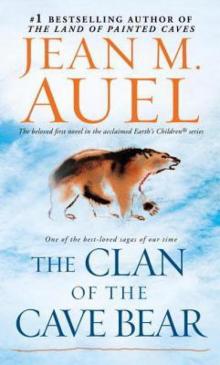 The Clan of the Cave Bear
The Clan of the Cave Bear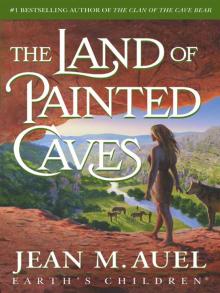 The Land of Painted Caves
The Land of Painted Caves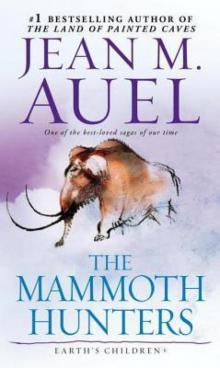 The Mammoth Hunters
The Mammoth Hunters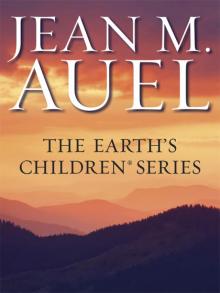 The Earth's Children Series 6-Book Bundle
The Earth's Children Series 6-Book Bundle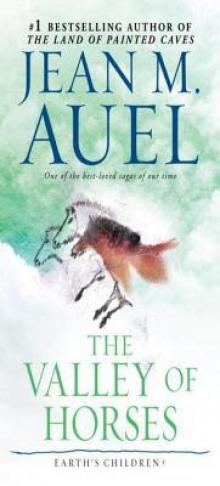 The Valley of Horses
The Valley of Horses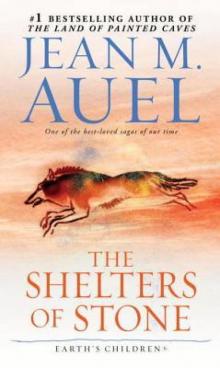 The Shelters of Stone
The Shelters of Stone The Clan of the Cave Bear ec-1
The Clan of the Cave Bear ec-1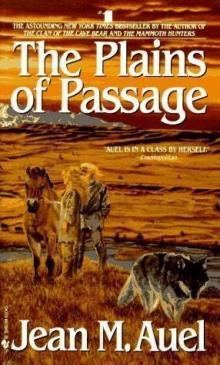 THE PLAINS OF PASSAGE ec-4
THE PLAINS OF PASSAGE ec-4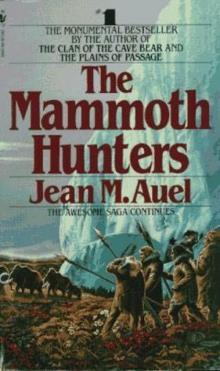 The Mammoth Hunters ec-3
The Mammoth Hunters ec-3 THE SHELTERS OF STONE ec-5
THE SHELTERS OF STONE ec-5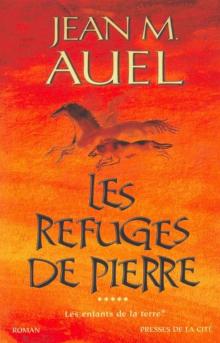 Les refuges de pierre
Les refuges de pierre![Earth's Children [02] The Valley of Horses Read online](http://i1.bookreadfree.com/i1/03/30/earths_children_02_the_valley_of_horses_preview.jpg) Earth's Children [02] The Valley of Horses
Earth's Children [02] The Valley of Horses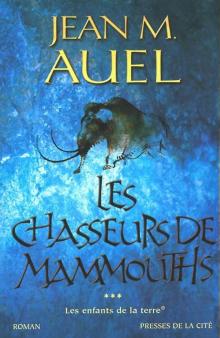 Les chasseurs de mammouths
Les chasseurs de mammouths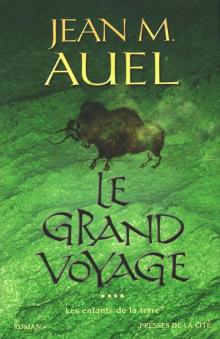 LE GRAND VOYAGE
LE GRAND VOYAGE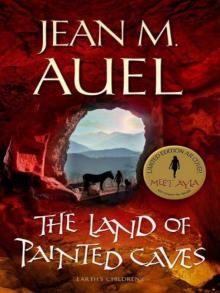 The Land of Painted Caves ec-6
The Land of Painted Caves ec-6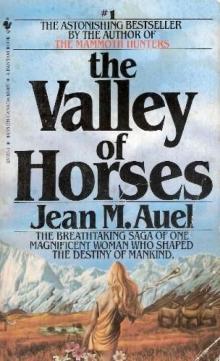 The Valley Of Horses ec-2
The Valley Of Horses ec-2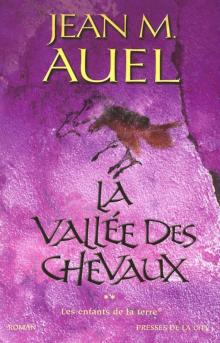 La Vallée des chevaux
La Vallée des chevaux